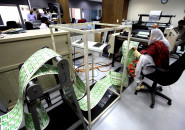Mitt Romney is right
Romney, Zakaria talk of such things as “Israeli” culture and “Indian” culture with reference to economic success.

Zakaria says this theory of a cultural explanation for economic success originally came from the sociologist Max Weber. The reason why the economies of Britain, Germany and America were so healthy, Weber said, was because of culture. The success of these states came because they had something called a Protestant ethic, which made them see work as worship. But Weber, who was writing a century ago, also said two cultures that had no hope of progressing were Japan and China — and we know how wrong he was about them. Zakaria says it is capitalism that drives economics and by this he means liberalised laws. He points to the low growth in India (which, he reminds us, was called the ‘Hindu rate of growth’) before 1991, when the economy began to open up and rates became healthy.
Romney and Zakaria both talk of such things as “Israeli” culture and “Indian” culture with specific reference to economic success. Romney believes the first is what brings Israel success; Zakaria says the second doesn’t play any part in India’s success since 1991. Zakaria says culture is important but always changing and so not significant. He also believes the success of Asians in America comes from immigrant drive, not culture.
I think Zakaria is wrong about this. If we examine this success, we can ascribe it to culture fairly quickly.
This can be demonstrated. What is common to the Fortune 500 leaders Vikram S Pandit (Citibank), Indra Nooyi (Pepsi), Sanjay Jha (Motorola), Sundar Pichai (Google) and Surya Mohapatra (Quest)?
All are Brahmins. Two Indians are the deans of world-class management institutions, Nitin Nohria of Harvard Business School and Dipak Jain of Insead. Both are Baniyas. Warren Buffett’s blue-eyed boy, Ajit Jain and Deutsche Bank’s CEO, Anshu Jain are Baniyas, too. Any scan of Indian success abroad, past or present, will continually throw up mercantile communities, whether Arun Sarin at Vodafone, Harish Manwani at Unilever or the Bohra Hatim Tyabji at Best Buy.
What Zakaria sees as “Indian” success is that of a couple of communities. This isn’t just about the success of Indians abroad. The 10 richest people in India are Lakshmi Mittal (Baniya), Mukesh Ambani (Baniya), Azim Premji (Lohana/Khoja), Ruia brothers (Baniya), Savitri Jindal (Baniya), Gautam Adani (Baniya), KM Birla (Baniya), Anil Ambani (Baniya), Sunil Mittal (Baniya), Adi Godrej (Parsi). Nine of the ten are from mercantile castes, including the only Muslim.
The thing to know is that these communities are absolutely tiny but are still able to produce most of our business champions. Why? Not genes, not magic — but culture. We can dismiss the data arising from the historical advantages of a few families, a statistical error or something else. But I don’t think that will bring much clarity. Eventually, we will have to settle on the difference in culture as the key element that explains this data.
Capitalism and its laws help but they can only help where the culture is receptive. Pakistan has laws more liberal than those of India and it opened up its economy much before India did. Still, it doesn’t have growth. Why is this so? I believe it is because the culture of the majority of Pakistanis orients them towards a national security state rather than an economically prosperous one. I have written about this earlier. I would say Romney is right — at least, about us.
Published in The Express Tribune, August 5th, 2012.


















COMMENTS
Comments are moderated and generally will be posted if they are on-topic and not abusive.
For more information, please see our Comments FAQ